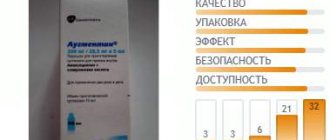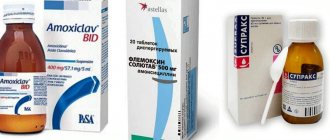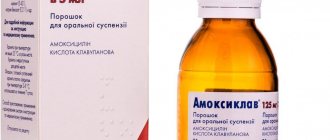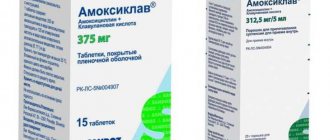Information about the medicine
Augmentin is a synthetic antibiotic and belongs to the penicillin group. The complex product contains clavulanic acid and amoxicillin. It has a wide spectrum of action and is effective against most bacteria.
Prescribing Augmentin is indicated for bacterial lesions of various systems and organs:
- ENT diseases;
- urinary tract disease;
- pathological processes of the genital tract of an infectious nature;
- infections of the bronchi and lungs;
- inflammatory processes of the skin and muscles;
- sepsis;
- dental abscesses.
It is possible to prescribe Augmentin for other types of pathologies.
How to take the medication depends on the severity of the infectious process:
- in case of severe pathologies, the drug is administered intravenously by stream or drip (injections into the muscle are prohibited);
- if the inflammatory process is moderate, then they are prescribed to drink suspensions or tablets (a child under 12 years of age is only allowed to take a mixture prepared from powder for dilution with water).
If adults are shown tablets with a standard dosage, which need to be taken 2-3 times a day before eating (food does not affect the activity of the medicine, but prevents adverse reactions from the gastrointestinal tract), then how to take Augmentin for a child is selected taking into account age. The doctor calculates the pediatric dosage in mg, taking into account the characteristics of the baby, and for successful treatment you need to follow the proposed recommendations.
Indications for use
Now let's look at what the indications must be in order to take this medicine. Moreover, Augmentin can be used by both adults and children. An adult can decide to use it before or after meals. But you should always remember that consumption before meals promises stomach problems.
First of all, the main indicators are the presence of inflammatory diseases. If we talk specifically about the positive aspects of the medicine, Augmentin treats the following diseases:
- infection in the upper respiratory tract, in the bronchi (for example, the medicine is indispensable for bronchitis);
- in the treatment of pneumonia, oropharyngeal infections;
- for skin infections, pathologies, the presence of E. coli;
- in the event of a pelvic infection, including after difficult childbirth, abortion, or other surgical interventions;
- diseases that can be sexually transmitted, for example, gonorrhea, syphilis, bone inflammation.
Duration of therapy
The annotation states that you should take Augmentin for 5-7 days . With longer use, dysbiosis and other negative consequences of antibiotic therapy may occur.
But what should a person do if the course of treatment with Augmentin has ended, a marked improvement in well-being has appeared, but the pathological symptoms have not completely disappeared. If you stop taking the antibiotic, complications and the disease may become chronic. To avoid this, there are several options:
- under the supervision of a doctor, Augmentin continues to be taken for up to 2 weeks;
- “stepped” therapy is carried out - first injections are given, and then Augmentin suspension or tablets are prescribed (for children under twelve years of age, only the liquid dosage form is allowed);
- an analogue is selected that acts on the body in the same way as Augmentin, but has a different composition (there are many analogues that have the same medicinal qualities as Augmentin).
Which option for continuing therapy will be chosen is decided individually. But you cannot take Augmentin on your own or give the medicine to a child for more than a week - uncontrolled use of the medication leads to negative consequences.
When prescribing a medication, you should always specify the duration of Augmentin use. If complete recovery does not occur within a week, you should consult your doctor about further therapy. It is not recommended to take Augmentin on your own for a long time until the symptoms completely disappear - undesirable consequences may arise from long-term use of the antibiotic.
Augmentin®
Before starting treatment with Augmentin®, it is necessary to collect a detailed history regarding previous hypersensitivity reactions to penicillins, cephalosporins, other beta-lactam drugs or other substances that cause an allergic reaction in the patient.
Serious and in some cases fatal hypersensitivity reactions (including anaphylactoid and severe skin adverse reactions) to penicillins have been reported. The risk of such reactions is highest in patients with a history of hypersensitivity reactions to penicillins and in individuals with atopy. If an allergic reaction occurs, treatment with Augmentin® should be discontinued and appropriate alternative therapy should be initiated.
If the infection is proven to be caused by microorganisms sensitive to amoxicillin, the possibility of replacing the combination of amoxicillin with clavulanic acid with amoxicillin should be considered in accordance with official recommendations.
The combination of amoxicillin and clavulanic acid is not suitable for use in cases where there is a high risk that the suspected pathogens have beta-lactam resistance that is not due to beta-lactamases susceptible to inhibition by clavulanic acid.
The combination of amoxicillin and clavulanic acid should not be used to treat infections caused by penicillin-resistant Streptococcus pneumoniae.
If infectious mononucleosis is suspected, Augmentin® should not be used, since amoxicillin can cause a measles-like skin rash in patients with this disease, which makes diagnosing the disease difficult.
The occurrence of generalized erythema with fever accompanied by pustules at the beginning of treatment may be a symptom of acute generalized exanthematous pustulosis. This reaction requires discontinuation of treatment with Augmentin® and is a contraindication for its further use in any situation.
Concomitant use of allopurinol during amoxicillin therapy may increase the likelihood of allergic skin reactions.
Long-term treatment with Augmentin® may lead to excessive proliferation of insensitive microorganisms. Cases of pseudomembranous colitis have been described when taking antibiotics, the severity of which can vary from mild to life-threatening. Therefore, it is important to consider the possibility of developing pseudomembranous colitis in patients with diarrhea during or after antibiotic use. If diarrhea is prolonged or severe, or the patient experiences abdominal cramps, treatment should be stopped immediately and the patient should be examined. If pseudomembranous colitis develops, appropriate treatment must be started. The use of drugs that inhibit intestinal motility is contraindicated.
During long-term therapy with Augmentin®, it is recommended to periodically evaluate renal, liver and hematopoietic function.
Convulsions may occur in patients with impaired renal function or in patients receiving high doses of the drug (see section "Side effects").
The combination of amoxicillin with clavulanic acid should be used with caution in patients with signs of liver dysfunction (see section "Side effects").
In patients receiving a combination of amoxicillin and clavulanic acid together with indirect (oral) anticoagulants, an increase in prothrombin time (increase in INR) has been reported in rare cases. When co-prescribing indirect (oral) anticoagulants with a combination of amoxicillin and clavulanic acid, monitoring of relevant indicators is necessary. Dosage adjustments may be required to maintain the desired effect of oral anticoagulants.
In patients with impaired renal function, the dose of amoxicillin with clavulanic acid should be reduced according to the degree of impairment.
In patients with reduced diuresis, crystalluria very rarely occurs, mainly during parenteral therapy. When administering high doses of amoxicillin, it is recommended to take sufficient fluids and maintain adequate diuresis to reduce the likelihood of amoxicillin crystal formation (see section "Overdose"). In patients with a catheterized bladder, it is necessary to regularly check the patency of the catheter, since according to the data obtained, amoxicillin deposits in bladder catheters mainly when administered intravenously in high doses.
Taking Augmentin® orally leads to a high level of amoxicillin in the urine, which can lead to false-positive results when determining glucose in the urine (for example, Benedict's test, Fehling's test). In this case, it is recommended to use the glucose oxidant method for determining the concentration of glucose in urine.
Clavulanic acid may cause nonspecific binding of immunoglobulins G and albumin to red blood cell membranes, leading to false-positive Coombs test results.
Positive results from a study using the Platelia Aspergillus ELISA diagnostic kit (Bio-Rad Laboratories) were reported in patients receiving amoxicillin plus clavulanic acid who were subsequently free of Aspergillus
. Cross-reactions with non-Aspergillus polysaccharides and polyfurans have been reported when tested using the Platelia Aspergillus ELISA diagnostic kit (Bio-Rad Laboratories). Therefore, positive test results in patients receiving a combination of amoxicillin and clavulanic acid should be interpreted with caution and confirmed by other diagnostic methods.
The laminated aluminum foil package contains a desiccant pouch that is not intended for ingestion.
Augmentin® must be used within 30 days of opening the laminated aluminum foil package.
Drug abuse and dependence
There was no drug dependence, addiction, or euphoric reactions associated with the use of Augmentin®.
When not to take
Next, we will analyze when it is not advisable to use the drug Augmentin, since there may be side effects and unpleasant consequences.
And so, it is better not to use the drug if there are such problems:
- impaired liver function;
- there is an individual intolerance to any component of the medicine;
- in case of infectious mononucleosis.
When a woman is pregnant or is breastfeeding, Augmentin is prescribed very conditionally, since it is not clear whether the drug can be used during this period. Most likely, this drug can pass into breast milk, so it is better not to risk the health of the mother and the baby itself. In such cases, it is advisable to choose alternatives prescribed by the doctor.
Now you know that it is correct to use Augmentin not before or after meals, but directly during meals.
Contraindications
Before starting to take an antibacterial agent, you must make sure that the patient does not have a history of the following contraindications:
- hypersensitivity to antibiotic components;
- intolerance to antibacterial agents of the penicillin and cephalosporin series;
- pathologies of liver activity;
- patient's age, younger than 12 years (for tablets) and less than 3 months from birth - for powder for preparing a suspension.
If a patient has contraindications to Augmentin, the doctor will prescribe an equivalent replacement and write a prescription for it.
Side effects
During Augmentin therapy, the following negative side effects may occur:
- digestive disorders, nausea and vomiting;
- feeling of dizziness, pain in the head and increased excitability;
- increased levels of liver enzymes;
- decrease in leukocytes and platelets in the blood;
- allergic manifestations, including Quincke's edema.
If the above or any other uncomfortable conditions develop, it is recommended to interrupt Augmentin therapy and seek advice from your doctor.
Dosages and release forms
Augmentin prescription in Latin can be prescribed in the form of tablets and powder for internal use.
Augmentin in tablet form is available in dosages of 875/125, 500/125 and 250/125 mg.
Augmentin in powder form for internal use is produced in 3 types:
- 228.5 mg/5 ml 70 ml;
- 457 mg/5 ml 70 ml;
- 642.9 mg/5 ml 100 ml.
How to store
It is quite easy to store Augmentin at home. The best option would be a dark and dry place - a shelf in a closet or chest of drawers, where children cannot reach.
The worst conditions - rooms with high humidity, storage in direct sunlight, freezing - contribute to rapid deterioration of the drug.
You can and should store the prepared solution for oral administration in the refrigerator. There is no need to store powder and tablets there.
Analogue drugs:
- Amoxiclav;
- Panclave;
- Flemoklav Solutab.










